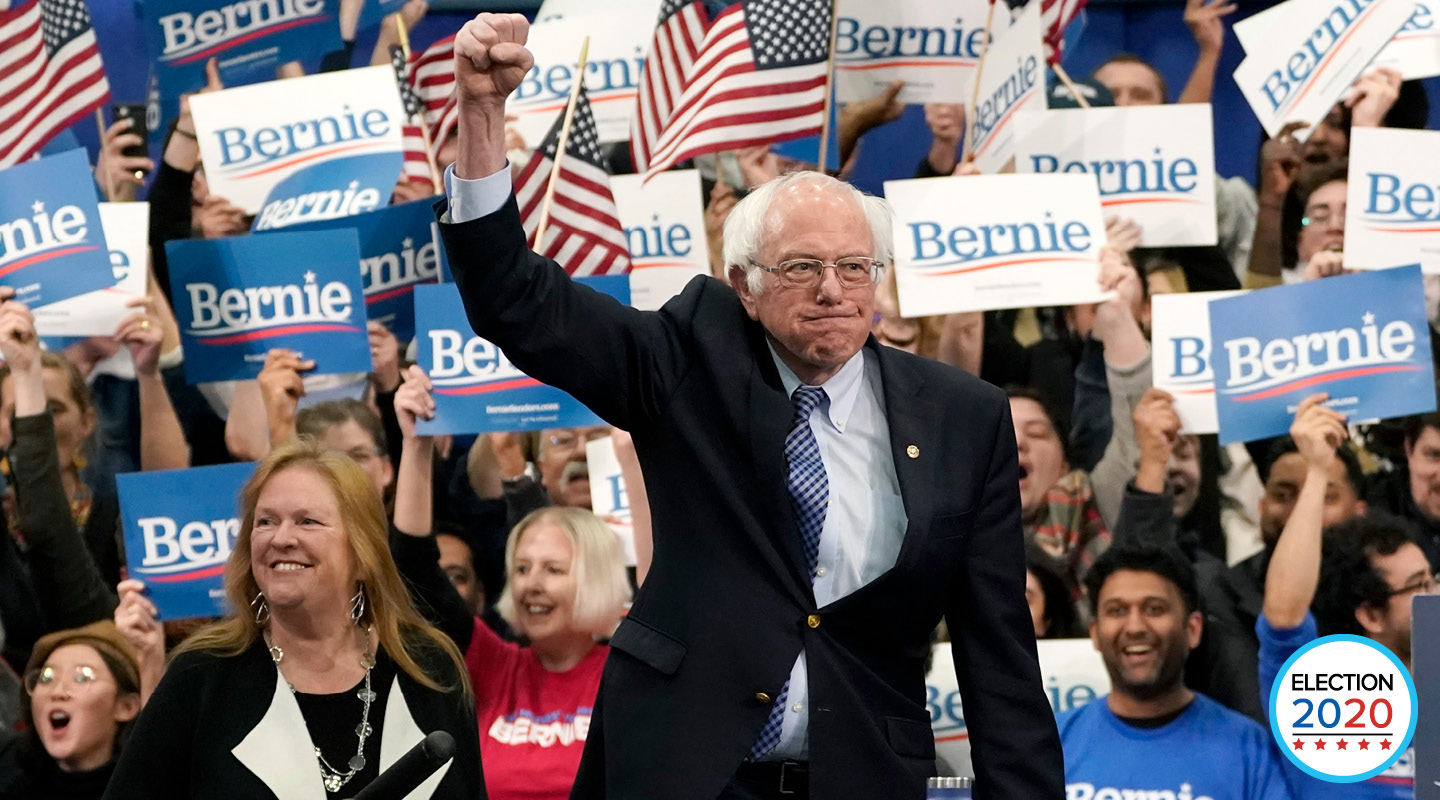Senator Bernie Sanders of Vermont won a narrow victory in the New Hampshire Democratic primary last night, earning about 26 percent of the vote. It was his second strong showing in two weeks, and his win establishes him as a strong contender for the Democratic nomination.
“This victory here is the beginning of the end for Donald Trump,” Sanders told cheering supporters in Manchester, New Hampshire, Tuesday night.
Pete Buttigieg, the former mayor of South Bend, Indiana, came in a close second with 24 percent. Buttigieg split the more moderate vote with Senator Amy Klobuchar of Minnesota, who surged in New Hampshire to finish in third place with 20 percent.
The results were a disappointment for Senator Elizabeth Warren of Massachusetts, who finished a distant fourth, and former vice president Joe Biden, who came in fifth with 8 percent. Essentially admitting defeat, Biden left New Hampshire before the polls had even closed on Tuesday to campaign in South Carolina ahead of that state’s February 29 primary. Biden entered the race as the presumed front-runner and had been leading in most national polls until recently.
The Biden campaign argues that the race for the nomination shouldn’t be judged until more diverse states participate, because Iowa and New Hampshire are heavily white unlike the rest of the country. But the weak finish in New Hampshire could jeopardize Biden’s fund-raising and his overall pitch to voters that he’s the Democrat best equipped to take on President Trump. Trump won New Hampshire’s Republican primary, winning 86 percent of the vote. Former Massachusetts governor William Weld won 9 percent of the Republican vote.
The results on the Democratic side indicate a split between progressive and moderate voters: The total vote for Sanders, who calls himself a Democratic socialist, was 26 percent—the lowest total ever for a primary winner in New Hampshire. Meanwhile, Buttigieg and Klobuchar—both moderates—collectively earned 44 percent of the vote.
Both Buttigieg and Klobuchar cast the results as victories for their campaigns.
“My heart is full tonight,” Klobuchar told her supporters as the New Hampshire results were still coming in. “While there are still ballots to count, we have beaten the odds every step of the way.”
Buttigieg said in his speech Tuesday night that New Hampshire voters had concluded that “a middle-class mayor and a veteran from the industrial Midwest was the right choice to take on this president, not in spite of that experience, but because of it.”
Turnout in New Hampshire was high: More than 275,000 people cast ballots in the primary, which is more than the 250,000 who voted in 2016 and approaching the record turnout of the 2008 presidential primary. More than 40 percent of New Hampshire voters are independent (officially called undeclared), and independents are allowed to participate in either primary.
Three Democratic candidates—entrepreneur Andrew Yang, Senator Michael Bennet of Colorado, and former Massachusetts governor Deval Patrick—dropped out of the race after poor showings in New Hampshire.
Meanwhile, a wildcard is waiting in the wings for the candidates who emerge energized from New Hampshire: Former New York City mayor Michael Bloomberg entered the Democratic race late and decided to skip the first four nominating contests and focus on the 14 states that vote on March 3. Bloomberg, a billionaire who is funding his own campaign, has spent more than $300 million on advertising and organizing in those states so far.
The New Hampshire primary came nine days after the Iowa caucuses, which kick off the presidential nominating process and this year were marred by chaos, inconsistencies, and delays. Iowa’s Democratic Party took days to report full results, finally awarding Buttigieg the most delegates, followed very closely by Sanders. But mistakes in some of the reported results led many news organizations, including the Associated Press and The New York Times, to hold off in declaring an outright winner in Iowa.
The uncertainty proved to be a disappointing beginning for Democrats, who had hoped to use Iowa to launch their effort to defeat President Trump in November.
“The Democrat Caucus is an unmitigated disaster. Nothing works, just like they ran the Country," Trump tweeted the morning after the Iowa caucuses.
The confusion added ammunition to the long-running debate over whether Iowa—a small, rural state that is much less diverse than the country as a whole—deserves to have such a high-profile role in the process of selecting presidential candidates. It also called into question whether caucuses—complex affairs that require voters to gather precinct by precinct and form into groups to select candidates—are a fair way to award delegates. Unlike a primary run by the state government, caucuses are managed by political parties, and they’re powered by the dedication of a small army of volunteers in every city and town of a state.
“It’s time to open up our process to a basket of states that is representative of the party and the country,” says former Virginia governor Terry McAuliffe, who has served as Democratic National Committee chairman.
And that could spell trouble for New Hampshire’s first-in-the-nation primary, says Dante Scala, a professor of political science at the University of New Hampshire.
“The thing is, once you open the box, where do the reforms end?” Scala wonders. “We’ve been joined at the hip with Iowa for so long in the process, people are going to say it’s got to be a twofer. You’ve got to take out Iowa and New Hampshire.”
Iowa and New Hampshire account for just a small fraction of the number of delegates needed to secure the Democratic nomination—just 40 and 24 delegates, respectively, of the 1,990 total required—and it’s shaping up to be a long race for the nomination. The next contests are the Nevada caucuses on February 22 and the South Carolina primary on February 29. After that comes Super Tuesday on March 3, when there will be 16 contests all across the country that collectively will allocate a third of all the delegates.

